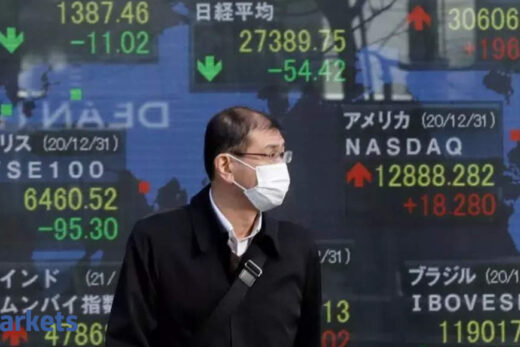LONDON: If central banks’ policies of zero interest rates and trillions of dollars of bond buying struggled to lift growth and inflation for over a decade, tighter monetary policy may be equally inefficient in reining them in.
At least that’s what research by International Monetary Fund economists suggests, arguing the increasing dominance of fewer and larger companies potentially undermines the impact of central bank policies on overall economic activity and prices.
Its findings underline concerns that the greater concentration of mega firms in economies, especially in the midst of the digital revolution, mean these outsized cash-rich businesses are also less sensitive to credit markets and bank lending – key conduits through which central bank policies affect overall activity.
The implications are potentially huge.
If growth rates are significantly higher in the years ahead and inflation keeps rising well above central bank targets for years, will central banks be forced into more severe tightening and interest rate rises than usual to cool it all down?
Or indeed if the ageing, developed world reverts to its decade-long path of “secular stagnation” shortly after bouncing back from the coronavirus pandemic, how hard will central banks have to push to prevent a relapse into deflation?
“Firms’ market power dampens the response of their output to monetary policy shocks,” concluded the working paper from IMF economists Romain Duval, Davide Furceri, Raphael Lee and Marina Tavares.
“Ever larger and more powerful companies are making monetary policy a less potent tool for managing the economy in advanced economies, all else equal,” a blog on the paper said.
The study of reams of company data from the United States and 14 other developed economies looked at the impact of a firm’s “markup” – or its margin between selling prices and costs – on its response to big changes in monetary policy.
The concept is straightforward.
Companies flush with cash from bigger profits and margins due to dominant market positions have less need to rely on credit and are relatively insensitive to credit policy as a result. The more of those firms that dominate aggregate economic activity, the bigger the problem for central banks.
What’s new is the data crunch to show it.
For U.S. businesses, the study found a 100 basis point rise in the Federal Reserve’s policy rate led to firms with low markups to cut sales by 2% after a year but had virtually no effect on the output of high markup firms.
The IMF staffers also cited other IMF research showing global corporate markups among publicly-listed firms had increased by some 30% on average since 1980 – and twice as fast in the digital sectors. And they say the pandemic is likely to amplify these trends, while seeing larger corporations gain market share as many small businesses go bust.
As an example, they pointed to cash piles of between $150 billion and $200 billion at tech giants Apple and Alphabet.
ANTITRUST
The central banking conundrum is clear – even if we’ve only seen it from the easy policy perspective in recent years.
Tighten too much to cool activity in future and policymakers could destabilise or unbalance the economy and hit smaller companies and poorer households disproportionately. Loosen too much and they risk blowing asset bubbles and undermining financial stability.
An obvious solution, according to the authors, is to double down on competition and antitrust regulation – challenging dominant companies, monopolistic practises or oligopolies more squarely while scrutinizing mergers and acquisitions more assiduously.
“Curbing corporate market power would not only support the recovery directly by stimulating investment, innovation and wage growth, but also indirectly by making monetary policy more powerful,” the IMF economists wrote.
Antitrust and competition issues have rapidly moved up the priority list of U.S. President Joe Biden’s new administration. China is in the midst of a sweeping antitrust crackdown on its technology sector. European Union regulators continue to harry the practises of Big Tech there.
Earlier this month, Biden signed a sweeping executive order to bolster competition within the U.S. economy, including a call for regulators to increase scrutiny of mergers that have left major sectors such as technology and healthcare dominated by few players.
Almost $700 billion worth of U.S. mergers and acquisitions were announced in the second quarter alone, the highest on record, and the M&A frenzy is likely to be fuelled by huge levels of corporate cash built up over pandemic lockdowns.
It’s not clear whether the proposed antitrust moves in the United States and elsewhere will be enough to tackle the problem outlined by the IMF study.
A silver lining right now may be that high markup companies with big cash buffers are better able to absorb post-lockdown surges in input prices or wage costs due to supply bottlenecks. By not passing on those costs to customers, they could help keep consumer inflation in check.
But for central banks still puzzling over why their extraordinary and forceful monetary policies over the past decade have had less effect than they imagined, the power of mega companies provides yet another twist in the tale.



